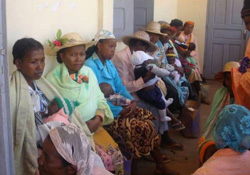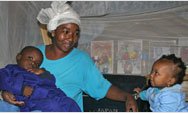You are here » Home » Telling Our Story
Success Story
Health insurance plans keep families healthy all year long
Affordable Insurance Improves Health

| |
Photo: USAID
|
|
These women in the community of Ambalamahasoa, Madagascar are all members of a health insurance scheme. They are bringing their children to get immunized at the local health center.
In 2005, USAID helped pilot five community-based health insurance schemes in five counties in Madagascar.
|
Every year, most of Madagascar’s population, especially in rural areas, goes through a lean period. When the rice harvests have been consumed and the next harvest is yet to come, households spend a large part of their savings to purchase food. They have very little, if any, money left for other expenses, including health care. The government has been looking for a way to reduce economic barriers to accessing health care, especially during the season when families have little cash.
In 2005, with the support from USAID, five community-based health insurance schemes, known locally as mutuelles, were piloted in five counties in Madagascar. Members make an annual contribution in cash or in crops. In exchange, they are entitled to receive health care throughout the year, including the lean season. As a result, these counties saw access to health care services significantly improve and preventive health activities increase.
The results have been positive. In one county, the mortality rate for children under four averaged 15 percent in 2003 and 2004. With the advent of mutuelles in 2005, the rate dropped dramatically to 5 percent. The insurance contributed to this decrease by requiring members to immunize their children, and allowing parents to bring their children to health facilities for treatment at the very onset of signs of illness.
In the five pilot counties, visits to health care facilities during the traditionally lean season increased between 40 percent and 140 percent. In addition, thanks to the program, the rate of immunization shots in the county exceeded the national average by 60 percent.
In addition to improving overall health in the counties, the programs have proven to government bodies that mutuelles contribute significantly toward better health and — in the long run — less poverty. As a result, Madagascar’s health ministry plans to set up 73 additional mutuelles in the southeastern province of Fianarantsoa with help from USAID.
Print-friendly version of this page (420kb - PDF)
Click here for high-res photo
Back to Top ^ | 

